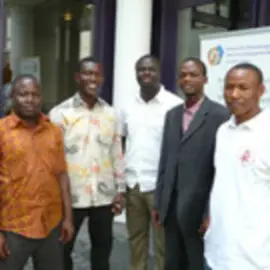"Excellence" students from Ghana visit ZEF
July 07, 2010.
Currently, five PhD Students and the Programme Coordinator of the ZEF/ISSER Development Studies Programme in Accra, Ghana, are at ZEF for a six week study and research stay. The ZEF/ISSER Programme is part of the DAAD-funded Africa-wide network of "Centres of Excellence for Promoting Future Leaders in Africa".
Interview with George Domfe and Clement Adamba
George (Economist, 36 years) and Clement (Social Scientist, 34 years) are both enrolled in the ZEF/ISSER Development Studies Programme in Accra, which is being sponsored by DAAD. ZEF discussed current development issues with these two up-coming African scientists during their six week stay at ZEF in Bonn.
What are Ghana’s most urgent development problems in your view?
George Domfe: Poverty, of course, but also the legal aspects of land distribution and the negative effects of our national health system. This system has increased inequalities among rich and poor, instead of reducing them. Another problem is our over dependence on foreign aid. Between 30%-40% of the Ghanaian national budget is made up of foreign aid, coming from the World Bank, IMF, etc. which is far too much. Donors always have their own agenda, which makes us too dependent and probably a little bit lazy.
Aren't the MDGs a jointly agreed agenda of the international community, including many African countries?
Clement Adamba: The MDGs are good in terms of re-focusing our own and joint development agenda. However, for Africa the targets are unrealistic. They are too high and the time schedule for achieving them is too tight. And Ghana is even doing well in the area of poverty reduction compared to other African countries. In 1990, 51.7% of Ghana’s population was classified as poor (less than 1$ a day), today this is 28.5% only. But we are still not doing well enough, I think.
George Domfe: Due to successful dispensation of democratization and good governance in Ghana during the last two decades, we have created stability and an investment-friendly environment. Ghana has seen a five percent annual domestic economic growth during the last decade. Still, we can see the negative effects of globalization. This phenomenon destroys our local industry and it is the main cause of a rather high unemployment rate. Even though the Ghana Statistical Service reports assesses unemployment rate at 3.6% only, the high incidence of working poverty implies that the majority of the so-called employed are not fully engaged after all.
How do you perceive the impact of African scientists – within their own societies?
George Domfe: Well, dialogue between the realms of science and politics is difficult. Politicians will always look at the short-term effects of their decisions, being bound to their mandate, whereas scientists focus by nature on long-term developments.
Clement Adamba: This is true, but Ghana has a number of well-equipped think tanks with up-to-date material and outcome. ISSER for example publishes an annual assessment of the Ghanaian economy. These think tanks are mainly funded from outside of Ghana and are therefore they are independent.
George Domfe: On the other hand, we have a very good rapport with the media. We are often engaged by the press for interviews, statements and background information. I myself explain economic issues to the public every Monday morning in a popular radio show.
What are the main challenges for African scientists?
George Domfe: First of all access to literature and internet. We found out during our stay here at ZEF in Bonn that the research and teaching level are quite similar. But in Africa things take their time.
Clement Adamba: It is still difficult for us African scientists to get our articles published in international journals. The majority of articles published there dealing with African issues is written by non-Africans. This is something we still have to work on.
Dear gentlemen, thank you for this interview.
The interview was conducted by Alma van der Veen, ZEF PR Officer.



